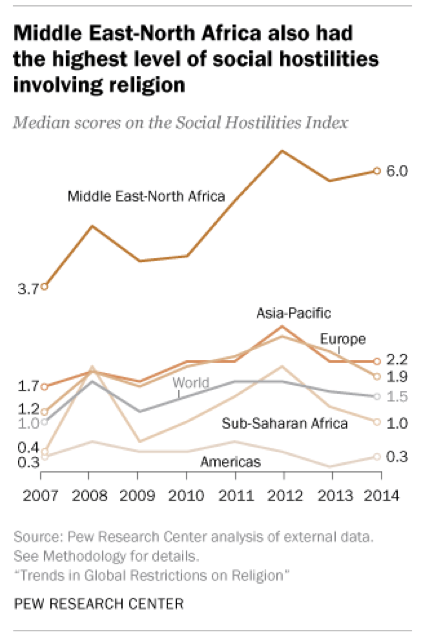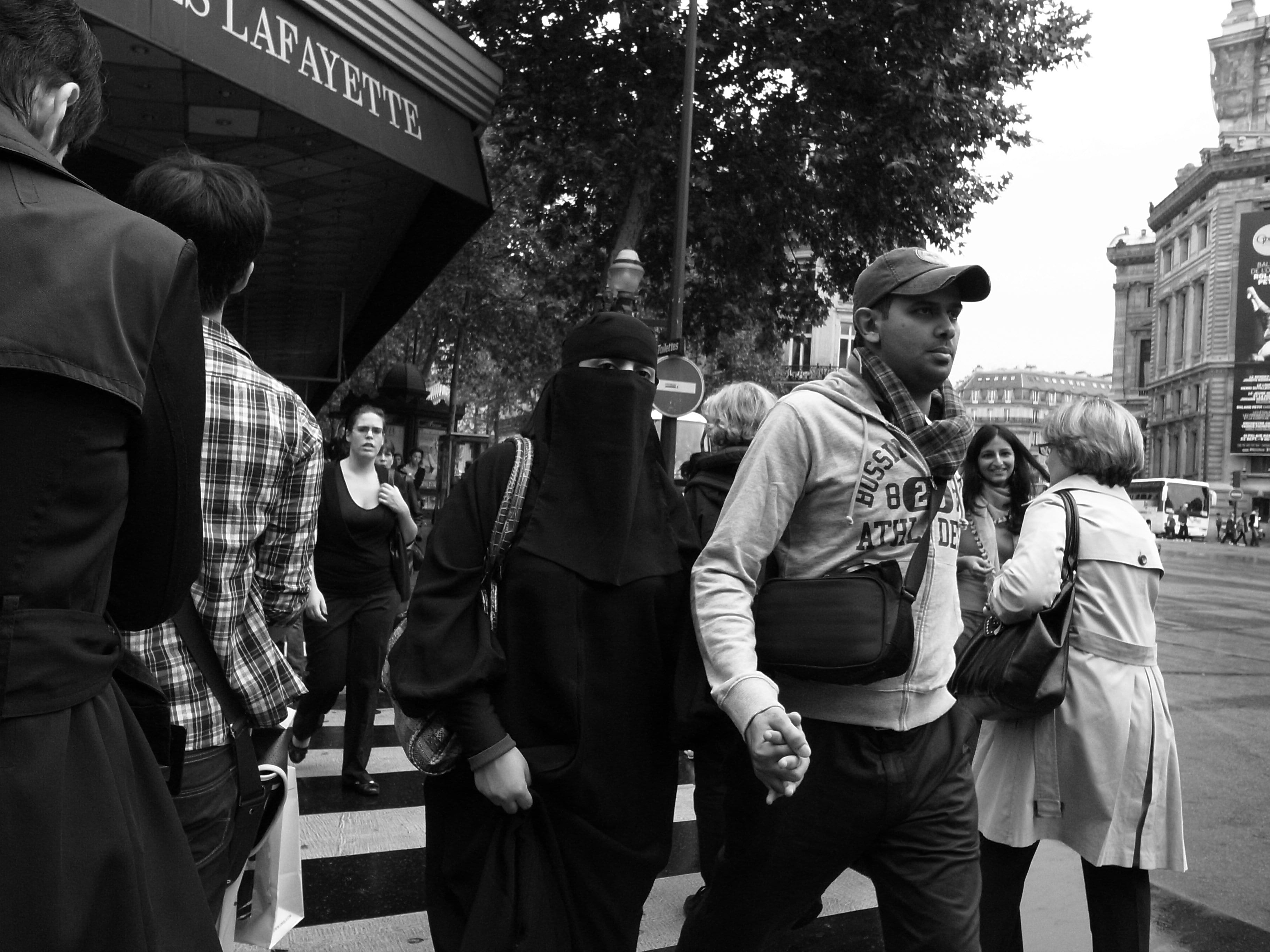
Perhaps one of the defining characteristics of religion is that it provides a structure for adherents to process the world around them. For the world’s Muslims, who have been rocked by isolated waves of violent extremism in recent decades, their religion provides a rich cultural history that is interwoven with grand narratives of holy wars, martyrs, and heroes. Scholars and public diplomacy officials are quick to point to these more violent narratives as the root cause of Islamic extremism—but these assertions do not explain why Islam, of all the world’s religions, has been most affected. These explanations, whether intentionally or not, ignore or minimize the effects of eroding political and religious control centers and rising global secularism that have acutely affected Muslim population centers.
The Rationale for Muslim Extremism
It is hard to fault scholars for trying to simplify the origins of this outbreak to a narrative susceptibility of the Muslim faith. In public diplomacy, where words are actions, exploring the cultural schema of a foreign community is an important exercise that can ensure that no communication further emboldens the very extremists that a communicator is trying to undermine. Of course, religions of all types include stories of war, conflict, and worldly struggles that have cosmic ramifications. And the overwhelming majority of religious scholars acknowledge that some of these cultural master narratives – especially the Abrahamic faiths of Islam, Christianity, and Judaism – provide a framework for individuals to process events that can run counter to western secular values. One needs only to look to the overt religious themes of Islamic State beheading videos or the hate mongering screed that fills Aryan Nations message boards to see what a religious narrative used to mobilize extremism looks like.

However, the Muslim world has been suffering from the acute effects of power vacuums of religion and state that have left room for extremist groups to grow accompanied by a rising global secularism that has increasingly alienated devout Muslims. In the midst of this societal turmoil, isolated pockets of fundamentalist believers and psychologically disturbed malcontents are prone to radicalization and acts of violence.
Power Vacuums of Religion and State
While Western governments are not entirely immune to the effects of eroding public trust, Islamic nations — particularly those states where groups like the Islamic State and Al Qaeda have staked out a presence — have been racked by wars, coups and general unrest that involve complex structural problems in governance, demographics, and economics. Against this general backdrop of instability is an increasingly violent schism between various sects of Islam (namely fundamentalist Sunni and Shia groups) that can now reach a global audience with their specific brands of Islam.
At one time, the splintering effects of sectarianism were mitigated by the Muslim caliphs. As secular and spiritual leaders, they defined the faith for their followers and fulfilled a spiritual need for an Allah-sanctioned ruler on earth who could separate “right” interpretations from apostasy. Nominally secular governments took the caliphs place in the Middle East after the fall of the Ottoman Empire, some even providing religious leadership in the form of state sanctioned imams who work closely with political leaders to align state policy with the Koran. Even today, the close relationship between government and religion is supported by a plurality among Muslims in these nations who want to see religious leaders take on more political control.

However, when these secular governments fail to keep the peace in the Middle East, the power vacuums are often filled with religious extremists– especially in nations where government’s implicit support for harsh treatment of religious minorities, “heretics” and “apostates” is present. Weak or oppressive governments in Afghanistan and Pakistan and in Syria and Iraq have been blamed for the rise of Al Qaeda and ISIL.
Rising Secularism and Group Identification Pressures
At the same time, devout Muslims are facing a world that is increasingly ignorant of and outright hostile towards religion. Western nations with high percentages of Christian residents like the U.S., U.K., and Germany embrace religious freedom and tolerate religious practice. There are correspondingly low rates of radicalization in these countries. However, nations like France, which enshrines secularism and the exclusion of ecclesiastical control and influence in its constitution, are moving towards a new paradigm where liberalism and secularization means rejection of the “close-mindedness” and “backwards” thinking that accompanies religious practice. Muslims, who are cast as demeaning women and are a rapidly growing demographic in Europe, have been a visible target of reforms that ban full body Islamic religious dress like the niqab or the “burkini.” Other Abrahamic religions have largely discarded these practices, or their religious dress has been normalized over centuries of exposure. These same conservative Muslims are being asked to condemn fundamentalist extremists’ faith and “moderate” their behavior. This in-group, out-group mentality, and the disdain for religious peoples that accompanies it, alienate Muslims who themselves are fundamentalists, but have come to different conclusions about what their faith requires. Charismatic extremist groups like ISIL use this forced black/white, secular/religious paradigm to recruit fundamentalists and other disaffected Westerners who are drawn to the meaning and sense of purpose that a religious group can offer in an increasingly relativistic world.

A Rational Conclusion to Fundamentalist Oppression
After making the leap to extremism, fundamentalist adherents can easily rationalize acts of war and terrorism to further their geo-political goals as God’s will for their movement. For the Islamic State, this means conquering territory and drawing the west into a war that their members believe will trigger the apocalypse. For Al-Qaeda before them, it meant using terrorism to draw concessions from Western military forces abroad. Misguided attempts by the west to fight this extremism have only further inflamed tensions that excite members to join and fight.
Western nations must be vigilant in their efforts to minimize further impact of these global trends that have bolstered the rise of Islamic extremism and must be wary of ignoring these problems at home. Banning religious dress, forcing secularism, and otherwise alienating religious groups will only lead to more extremism, as France has seen after multiple local ordinances banning conservative Muslim dress became international news.
The rise of Islamic extremism is a lesson for the world’s leaders: Wherever people feel oppressed, ignored, and alienated in their own country; or where government leaves a vacuum of power, control, or support; there is ample opportunity for charismatic groups to provide the solution.
The views expressed in this blog are the author’s only and do not necessarily reflect those of George Washington University.


2 thoughts on “People of the Book: What Explains the Rise of Extremism in The Muslim World?”